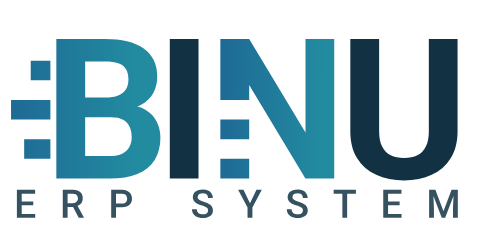Table of Contents
- Introduction
- What is Manufacturing?
- ERP in Manufacturing
- Top 10 ERP Systems for Manufacturing
- Key Aspects to Consider When Searching for an ERP System
- ERP for Small, Medium, and Large Manufacturers
- ERP Market Overview
- Binu ERP – Making Discrete Manufacturing Easier
- Manufacturing Terminology
- FAQs
- Conclusion
Introduction
As the manufacturing industry continues to evolve, businesses of all sizes are turning to Enterprise Resource Planning (ERP) systems to streamline operations, enhance productivity, and maintain a competitive edge. This article will provide as a basic guide to the top ERP systems for manufacturing, highlighting their strengths, and discussing how they work for different types of manufacturing businesses.
We will dive into what ERP in manufacturing entails, explore the meaning of manufacturing, and examine how ERP systems impact the industry. We’ll also discuss key differences between ERP systems for small, medium, and large businesses, and provide insights into the broader ERP market. Lastly, we’ll spotlight how Binu ERP System is helping the industry for discrete manufacturers.
What is Manufacturing?
Manufacturing meaning refers to the process of transforming raw materials into finished products through the use of tools, human labor, machinery, and chemical processes. It’s a core sector in the global economy, serving industries such as automotive, electronics, and consumer goods. Within manufacturing, different categories exist, such as discrete manufacturing and process manufacturing.
In discrete manufacturing, products are assembled from distinct parts and can be broken down into their components, think automotive or electronics industries. Process manufacturing, on the other hand, involves formulas or recipes to create items like chemicals, food, and beverages, where the product cannot be disassembled into its original components.
ERP in Manufacturing
ERP in manufacturing integrates various business functions, such as inventory management, procurement, supply chain management, human resources (HR), and finance, into one system, offering a complete view of the business. This allows manufacturers to improve their production schedules, minimize waste, and improve customer satisfaction.
An ERP in the manufacturing industry offers real-time data across all operations, enabling better decision-making, resource allocation, and operational transparency. For example, it can help a manufacturing firm predict or forecast different needs, reducing downtime and improving productivity.
Key Benefits of ERP Systems in Manufacturing
- Streamlined Operations: Integrates different departments, facilitating communication and enhancing operational efficiency.
- Better Resource Management: By giving businesses real-time insights, ERP ensures that resources are used efficiently.
- Increased Profitability: With less downtime, fewer bottlenecks, and optimized workflows, profitability increases.
Top 10 ERP Systems
- SAP S/4HANA
- Industries: Aerospace, Automotive, Chemicals
- SAP S/4HANA is renowned for its scalability and flexibility, making it a favorite for large-scale manufacturers with complex global operations.
- Oracle NetSuite
- Industries: Consumer Goods, Electronics
- Cloud-based and designed for small to medium-sized businesses, NetSuite provides integrated financials, CRM, and ecommerce capabilities.
- Microsoft Dynamics 365
- Industries: Retail, Food & Beverage
- A highly adaptable solution that integrates with other Microsoft products, Dynamics 365 is ideal for mid-sized manufacturers with complex supply chains.
- Infor CloudSuite Industrial (Syteline)
- Industries: Aerospace, Electronics, Industrial Equipment
- Infor CloudSuite offers robust functionality for managing end-to-end manufacturing processes, especially in specialized and complex industries.
- Epicor ERP
- Industries: Automotive, Industrial Machinery
- Known for its strength in discrete manufacturing, Epicor ERP is widely used by mid-market manufacturers focused on growth.
- IQMS (DelmiaWorks)
- Industries: Plastics, Packaging
- Tailored for manufacturers, IQMS offers tools to manage production, quality control, and supply chains, making it perfect for process-driven industries.
- SYSPRO
- Industries: Food & Beverage, Electronics
- SYSPRO specializes in mid-market manufacturers, offering scalability and robust features such as lot traceability, warehouse management, and demand forecasting.
- Acumatica Cloud ERP
- Industries: Electronics, Automotive
- Designed for growing businesses, Acumatica is known for its cloud capabilities, ease of use, and customization for different manufacturing types.
- IFS Applications
- Industries: Aerospace, Defense, Automotive
- IFS is well-regarded for large, asset-heavy industries, offering robust project management, product lifecycle management (PLM), and field service functionality.
- Plex Manufacturing Cloud
- Industries: Automotive, Industrial Equipment
- Built for the manufacturing industry from the ground up, Plex offers real-time data, providing insights that can improve operational efficiency.
In addition you have our system, the Binu enterprise resource planning system, that we will cover later in this article. Intuitive and modular for small and medium discrete manufacturing companies.
For list of different software vendors on Wikipedia click here.
Key Aspects to Consider When Searching for an ERP System
Selecting the right ERP system for your manufacturing business can be a complex decision. Here are some key aspects to keep in mind:
- Industry-Specific Functionality
Ensure that the ERP system offers modules and features tailored to your specific manufacturing type, whether it’s discrete, process, or hybrid manufacturing. Look for functionalities like shop floor control, inventory management, and production scheduling that are crucial for your industry. - Scalability
Consider the long-term growth of your business. Will the ERP system scale with your company as it expands? The right ERP should offer flexibility to grow and adapt to changing business needs, without requiring a full system overhaul. - Cloud vs. On-Premise
Decide whether a cloud-based ERP or on-premise solution suits your business best. Cloud solutions generally offer lower upfront costs, easy updates, and remote access, while on-premise systems give you full control over data but may require higher initial investment and maintenance. - User-Friendliness and Training
The ERP should be intuitive for users across all departments, from production floor workers to management. Consider the training and support options provided by the vendor to ensure a smooth transition and ongoing ease of use. - Integration with Existing Systems
Your chosen ERP must integrate seamlessly with existing software or have functionalities, such as customer relationship management (CRM), accounting software, or other supply chain tools. Look for systems that have or can connect what is important for you. - Cost and Return on Investment (ROI)
The total cost of ownership includes not just the initial purchase price but also implementation, training, and maintenance. Evaluate how quickly the ERP will deliver measurable benefits like reduced costs or improved efficiency to justify the investment. - Customization Options
Ensure the ERP system can be used to meet your unique business processes. Manufacturers can sometimes need specific workflows and reporting tools, so the system must be adaptable or working like expected without excessive complexity or cost. - Vendor Reputation and Support
Research the ERP vendor’s reputation, testimonials or reviews, and resources offered. A reliable vendor will offer robust technical support, regular updates, and a proven history of working with companies.
How ERP Systems Improve Sustainability and Growth
ERP systems can help manufacturers adopt more sustainable practices. It could explore how software can help reducing waste, improving resource efficiency, and supporting modern manufacturing initiatives. You can also discuss how ERP systems provide insights that help companies track their waste, material use, and manage more control.
In addition adding to the growing demand for sustainable business practices, offering a socially responsible angle while remaining efficient and profitable with company operations.
ERP for Small, Medium, and Large Manufacturers
Small Manufacturers
Small scale manufacturing companies require ERP systems that are cost-effective and easy to implement, with a focus on basic inventory management, accounting, and order tracking. Solutions like Acumatica, NetSuite or Binu are well suited for small businesses because they are cloud based, allowing for lower upfront costs and scalable growth.
Medium Manufacturers
Medium sized companies often need more sophisticated functionalities to manage complex supply chains, multiple production facilities, and compliance. Microsoft Dynamics 365 and Epicor ERP provide mid-market solutions with advanced features for growing businesses.
Large Manufacturers
Large manufacturers typically operate across multiple locations, manage complex supply chains, and require systems with robust capabilities for advanced planning and scheduling, global financial management, and compliance. SAP S/4HANA and Oracle NetSuite dominate this space, offering the breadth and depth needed for multinational operations.
Guide we have published for small and medium companies you can read here.
ERP Market Overview
The ERP market continues to grow as the digital transformation for manufacturing continues for the whole industry and recognize the need for integrated solutions to manage their increasingly complex and expanding operations. In 2023, the global ERP market for manufacturing alone was expected to exceed approximately $40 billion, driven by trends such as Industry 4.0, the Internet of Things (IoT), Ai features and “smart” featured systems.
You can also read about the different industry trends and history of ERP systems here.
Binu ERP Making Discrete Manufacturing Easier
At Binu, we specialize in providing solutions tailored to discrete manufacturers or producers, those that produce distinct items such as vehicles, machinery, and electronics. Our solution helps manufacturers manage everything from inventory to production scheduling in the cloud, enhancing overall operational efficiency. In a intuitive and user friendly way without deep technical knowledge.
Discrete manufacturing involves assembling products from different components, which can be individually replaced or repaired. Binu’s ensures that discrete manufacturers can track each component and manage production efficiently while maintaining high quality.
Visit our page on Binu ERP to learn more about how we help discrete manufacturers achieve operational excellence.
Manufacturing Terminology
- Bill of Materials (BOM): A detailed list of the raw materials, parts, and components required to manufacture a product.
- Lean Manufacturing: A methodology aimed at minimizing waste within systems without sacrificing productivity.
- Just-in-Time (JIT): An inventory strategy to improve efficiency by receiving goods only as they are needed in the production process.
- Shop Floor Control: The method of controlling the production activities on the factory floor, including work orders, schedules, and workforce management.
- Production Planning: A strategy to plan production schedules, workforce requirements, and raw material needs to ensure that production goals are met.
You can read more from our terminology page published on our site here.
Article FAQs
- What is ERP in manufacturing?
ERP in manufacturing integrates various business functions, offering real-time data to optimize operations, reduce costs, and improve customer satisfaction. - What industries use ERP systems the most?
Industries like automotive, aerospace, electronics, food & beverage, and industrial machinery benefit significantly from ERP systems. - What is discrete manufacturing?
Discrete manufacturing produces items that can be assembled from distinct components and can be taken apart, such as automobiles or electronics. - How does ERP benefit small manufacturers?
Small manufacturers benefit from ERP by automating basic processes like order tracking, inventory management, and accounting, leading to reduced costs and improved efficiency. - What’s the future of ERP in manufacturing?
With trends like Industry 4.0, ERP systems will continue to evolve, offering enhanced features like predictive maintenance, AI-powered analytics, and IoT integration.
Conclusion
ERP software are a critical tool for manufacturers looking to optimize operations and gain a competitive advantage. From small to large businesses, ERP solutions can be tailored to meet specific needs, improving resource management, production efficiency, and profitability.
The right ERP system, whether it’s Binu ERP for smaller discrete manufacturers or other solutions, this can make all the difference in staying ahead in a fast growing market.
Be sure to check out the Binu ERP homepage to learn more about how our solution can help your business robust for efficient operations or data based growth. Feel free to read about our different modules and resources. You can also request a free ERP demo here.
Disclaimer: The ERP systems and vendors mentioned in this article are presented solely for informational purposes and as objectively as we can. While we strive to provide accurate and up-to-date information, the inclusion of these systems does not imply endorsement, fully correct information or any partnership. Each ERP solution is different, and the suitability for your business may vary based on specific requirements and circumstances. We recommend conducting your own research, outreach and consulting with professionals before making any decisions.

